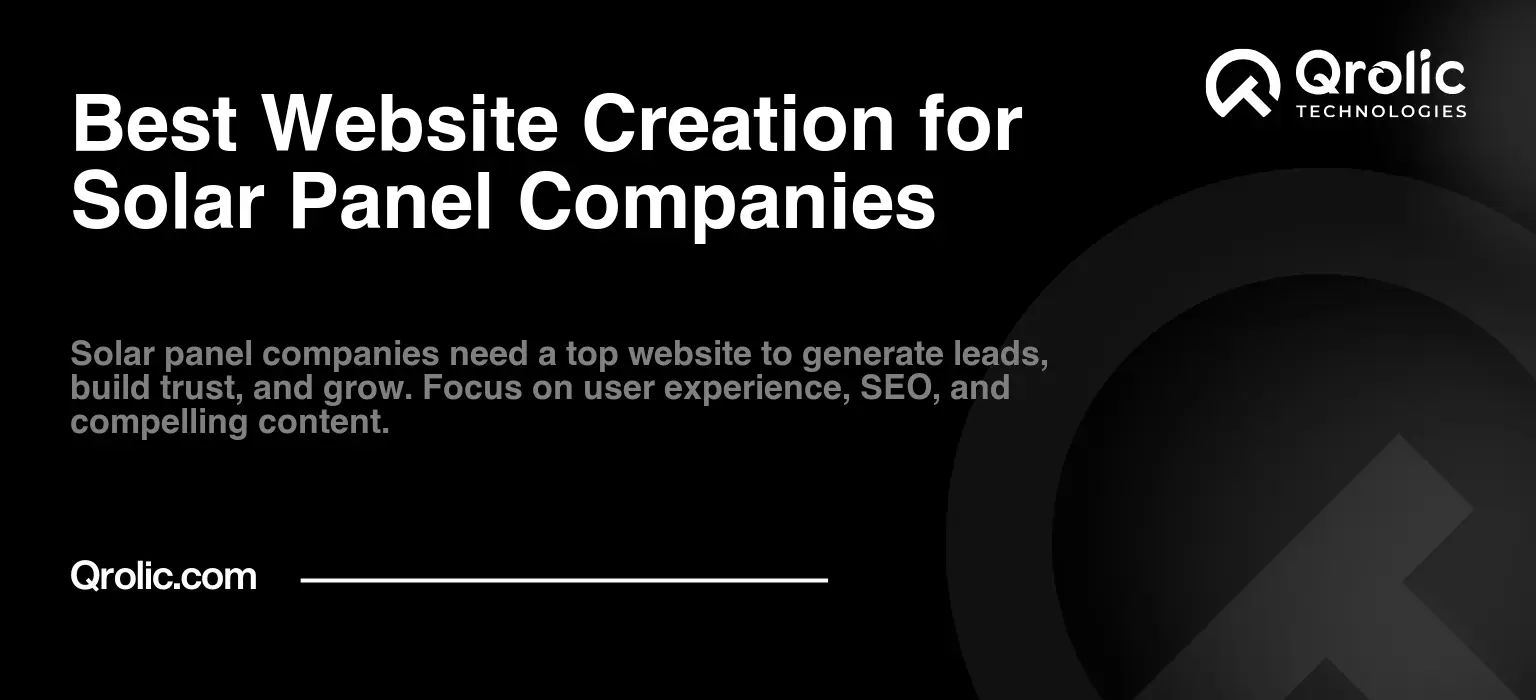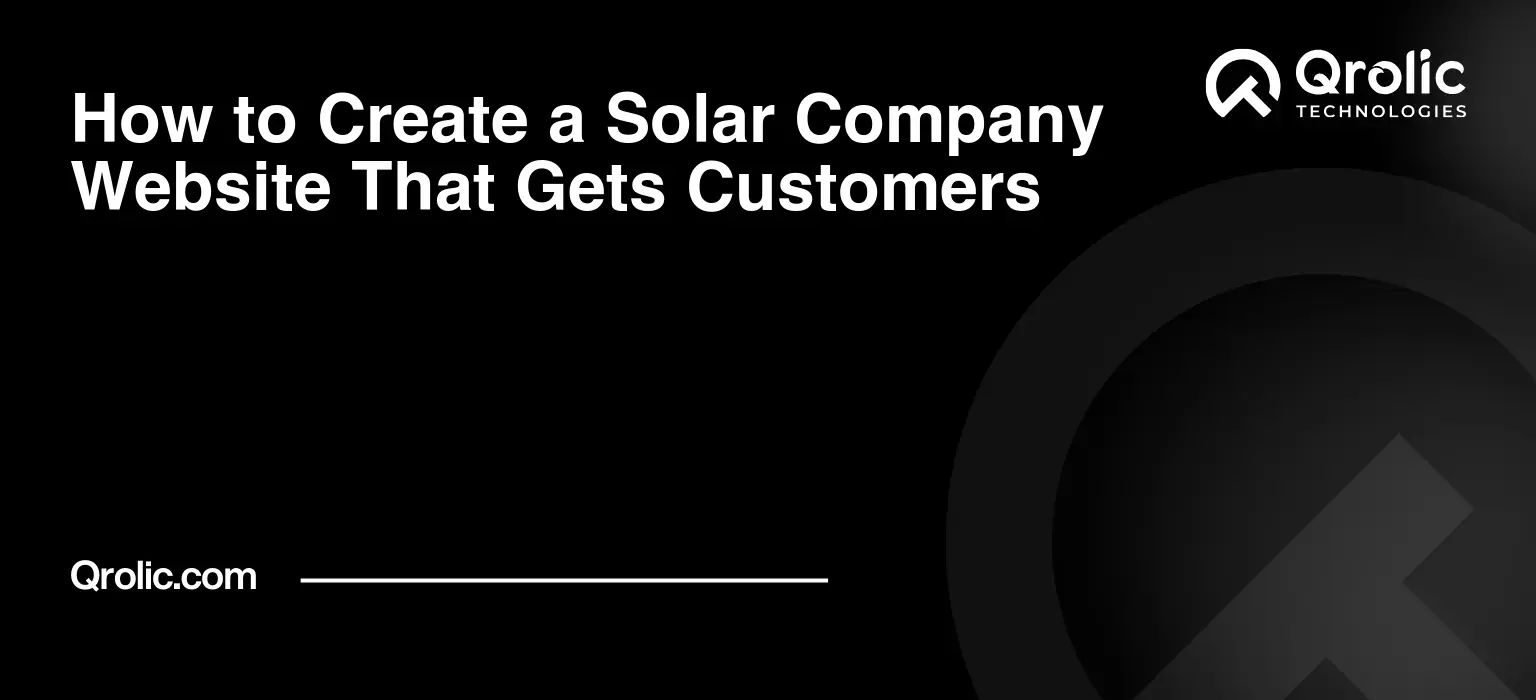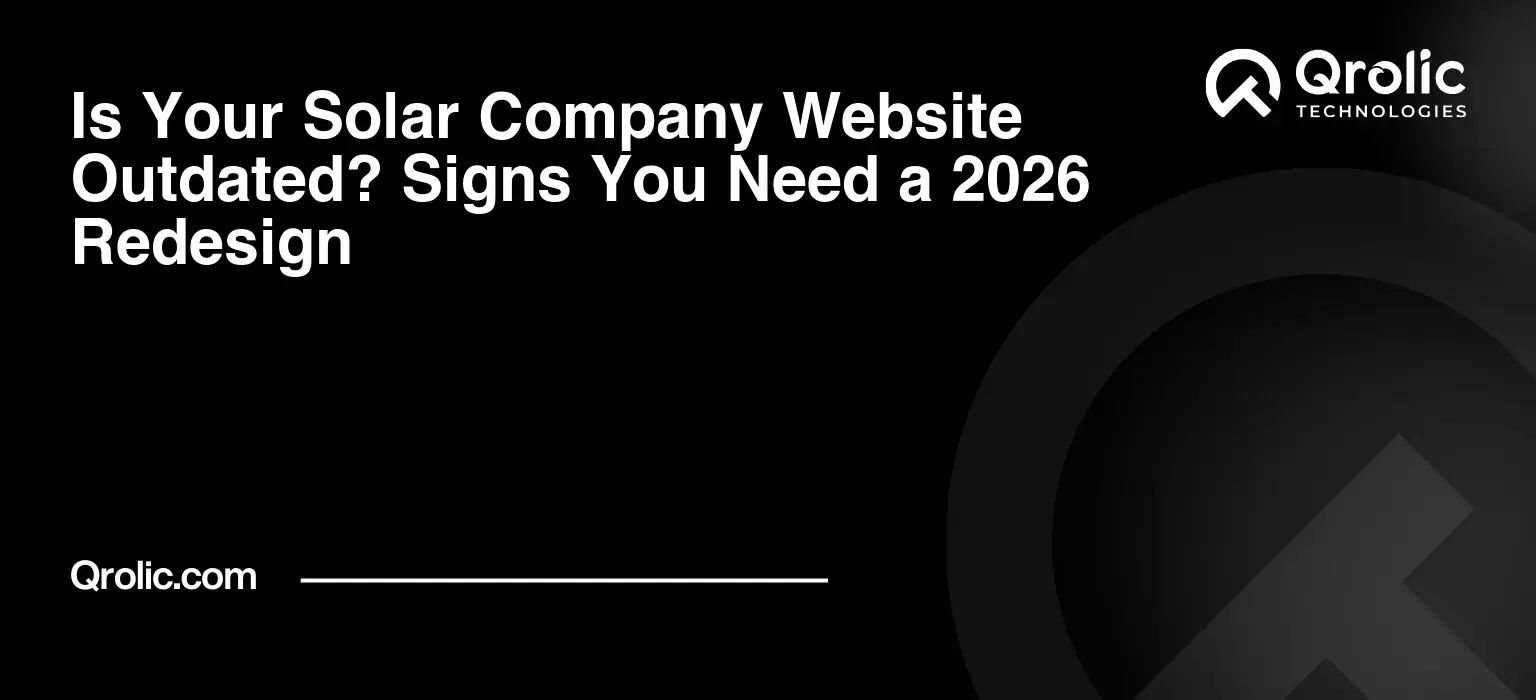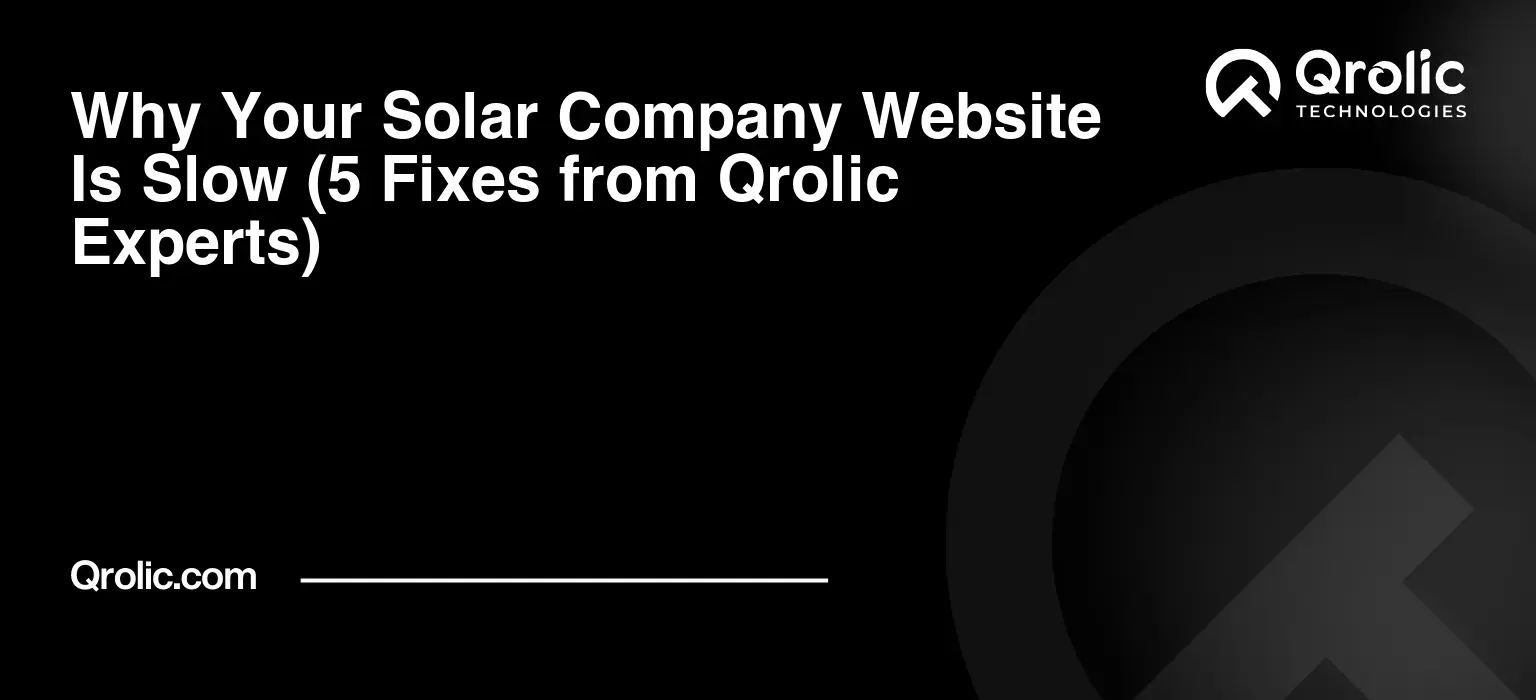Quick Summary:
- A strong website attracts leads and builds trust 24/7.
- Essential elements include great design, clear content, and CTAs.
- Optimize for SEO, local search, and fast mobile loading.
- Engaging content marketing boosts traffic and authority.
Table of Contents
- Why Your Solar Panel Company Needs an Exceptional Website
- Essential Elements of a High-Performing Solar Panel Website
- 1. Visually Appealing and User-Friendly Design
- 2. Clear and Compelling Content
- 3. Strong Calls to Action (CTAs)
- 4. Search Engine Optimization (SEO)
- 5. Easy Navigation and User Experience
- 6. Lead Capture Forms
- 7. Local SEO Optimization
- 8. Security and Privacy
- The Website Creation Process: A Step-by-Step Guide
- Step 1: Define Your Goals and Target Audience
- Step 2: Plan Your Website Structure and Content
- Step 3: Choose a Website Platform
- Step 4: Design Your Website
- Step 5: Develop and Populate Your Website
- Step 6: Test and Optimize
- Step 7: Launch and Promote
- The Role of Content Marketing in Website Success
- Types of Content You Should Create
- Qrolic Technologies: Your Partner in Solar Website Creation
- Final Thoughts: Investing in Your Online Presence
Why Your Solar Panel Company Needs an Exceptional Website
In today’s digital-first world, a website isn’t just an online brochure; it’s the cornerstone of your business. For solar panel companies, a powerful and user-friendly website is essential for attracting leads, building trust, and ultimately, driving sales. Why? Because most potential customers start their journey online, researching options, comparing prices, and evaluating companies before ever picking up the phone. If your website doesn’t make a strong first impression and effectively communicate your value proposition, you’re likely losing out on significant business.
Think of it like this: your website is your 24/7 salesperson. It doesn’t sleep, it doesn’t take breaks, and it’s always ready to answer questions and showcase your expertise. A poorly designed or difficult-to-navigate website will deter potential clients, leaving them with a negative impression of your company. On the other hand, a well-crafted website can position your solar panel company as the go-to expert, building credibility and fostering a strong connection with potential customers.
Here’s a closer look at why a solid website is non-negotiable for solar panel companies:
- First Impressions Matter: Your website is often the first interaction a potential client has with your brand. A professional, visually appealing website instantly builds trust and credibility.
- Lead Generation Powerhouse: A well-optimized website attracts qualified leads through search engines and other online channels, allowing you to capture potential customers actively seeking solar solutions.
- 24/7 Availability: Your website works tirelessly, providing information about your services, pricing, and company values, even when you’re not actively engaging with clients.
- Showcase Your Expertise: Use your website to demonstrate your knowledge, highlight successful projects, and explain the benefits of solar energy.
- Build Customer Trust: Testimonials, certifications, and detailed information about your company and team instill confidence in potential clients.
- Streamline Communication: Integrate contact forms, chat features, and FAQs to address customer inquiries quickly and efficiently.
- Competitive Edge: A superior website differentiates you from competitors and positions your company as a leader in the solar panel industry.
- Measure and Optimize: Website analytics allow you to track performance, identify areas for improvement, and make data-driven decisions to maximize your ROI.
Essential Elements of a High-Performing Solar Panel Website
Creating a website that truly converts requires careful planning and execution. It’s not enough to simply have an online presence; you need a strategic approach that focuses on user experience, lead generation, and showcasing your unique value proposition. Here are the crucial elements every successful solar panel company website must possess:
1. Visually Appealing and User-Friendly Design
- Clean Layout: Avoid cluttered designs. Opt for a clean, spacious layout that’s easy on the eyes and facilitates seamless navigation.
- Mobile Responsiveness: Ensure your website is fully responsive and adapts flawlessly to all screen sizes, including smartphones and tablets. A significant portion of your website traffic will be on mobile devices.
- High-Quality Imagery and Videos: Use professional, high-resolution images and videos to showcase your installations, team, and the benefits of solar energy. Visuals make your content more engaging and memorable.
- Consistent Branding: Maintain a cohesive visual identity that reflects your brand’s personality and values through the use of consistent colors, fonts, and logos.
2. Clear and Compelling Content
- Home Page Essentials: Craft a strong home page that immediately conveys what you do, the benefits you offer, and a clear call to action (e.g., “Get a Free Quote”). Highlight your key services and use captivating headlines.
- Services Page: Provide detailed information about your solar panel installation services, including the types of systems you offer (residential, commercial, ground-mounted, etc.), warranties, and financing options.
- About Us Page: Tell your story, share your company’s mission and values, and introduce your team. This humanizes your brand and builds trust with potential clients.
- Blog Section: Regularly publish insightful articles, case studies, and industry news to establish your company as a knowledgeable resource in the solar energy sector. This helps with SEO and builds engagement.
- Case Studies and Portfolio: Showcase successful projects with detailed descriptions, before-and-after photos, and testimonials to demonstrate your expertise and build confidence.
- Frequently Asked Questions (FAQs): Address common customer inquiries about solar panel systems, installation processes, and financing options to ease concerns and build trust.
- Testimonials and Reviews: Display positive testimonials and reviews from satisfied clients to build social proof and credibility.
3. Strong Calls to Action (CTAs)
- Prominent Placement: Ensure your CTAs are prominently displayed and easy to find throughout your website. Examples include “Get a Free Quote,” “Request a Consultation,” “Contact Us,” and “Learn More.”
- Action-Oriented Language: Use compelling language that encourages visitors to take the next step. Use words that are action-oriented and clearly describe the next step.
- Multiple CTAs: Incorporate multiple CTAs across different pages to guide visitors to conversion points.
4. Search Engine Optimization (SEO)
- Keyword Research: Identify relevant keywords that potential clients use when searching for solar panel services, for example “solar panel installation”, “residential solar system”, “commercial solar panels” etc.
- On-Page Optimization: Strategically use these keywords within your website content, including page titles, meta descriptions, headings, and image alt tags.
- High-Quality Content: Create comprehensive, informative content that satisfies search engine algorithms and provides value to your website visitors.
- Mobile Optimization: Ensure that your website is fully mobile responsive, because search engines prioritize mobile friendly websites.
- Link Building: Earn high-quality backlinks from reputable websites to boost your domain authority.
5. Easy Navigation and User Experience
- Intuitive Menu: Use a clear and concise navigation menu that makes it easy for visitors to find the information they need.
- Site Map: Create a sitemap to help search engines crawl and index your website more efficiently.
- Fast Loading Speed: Optimize your website’s loading speed to enhance the user experience and improve search engine rankings.
- Clear Contact Information: Provide easy access to your contact information, including phone number, email address, and physical address.
- Live Chat Support: Consider integrating a live chat feature to provide instant assistance to website visitors and answer their questions in real-time.
6. Lead Capture Forms
- Strategically Placed Forms: Integrate lead capture forms in various areas of your website, such as the home page, contact page, and service pages, to collect valuable lead information.
- Clear and Concise Forms: Keep your forms short and easy to fill out to encourage conversions. Only ask for the necessary information.
- Incentivize Form Submission: Consider offering a free quote, consultation, or ebook to incentivize visitors to fill out your forms.
7. Local SEO Optimization
- Google My Business: Claim and optimize your Google My Business listing with accurate information, photos, and customer reviews.
- Local Keywords: Incorporate location-based keywords (e.g., “solar panels in [city name]”) throughout your website content.
- Online Directories: List your business in relevant online directories to improve your local search visibility.
- Local Citations: Ensure that your business name, address, and phone number (NAP) are consistently listed across all online platforms.
8. Security and Privacy
- SSL Certificate: Install an SSL certificate to ensure your website is secure and protects your visitors’ data. This is an essential security feature for every website.
- Privacy Policy: Clearly outline your website’s privacy policy to build trust with users and comply with regulations.
The Website Creation Process: A Step-by-Step Guide
Building a successful website doesn’t have to be overwhelming. By breaking the process into manageable steps, you can ensure that you are creating a high-performing website that meets your business needs. Here’s a step-by-step guide to website creation for solar panel companies:
Step 1: Define Your Goals and Target Audience
- What are your business goals? Are you aiming to increase leads, boost sales, or establish your brand as an authority in the solar panel industry?
- Who is your target audience? Are you targeting residential homeowners, commercial businesses, or both? Understanding your audience will inform your content strategy and design decisions.
- What are your key differentiators? What makes your company unique? What value do you provide that your competitors do not?
Step 2: Plan Your Website Structure and Content
- Create a Site Map: Outline the pages you need, such as your home page, services page, about us page, contact page, blog, and portfolio.
- Develop Content for Each Page: Create compelling, informative content that resonates with your target audience and highlights your key offerings. Research keywords and integrate them into your content strategy.
- Gather High-Quality Visuals: Collect professional, high-resolution photos and videos of your team, projects, and installations.
Step 3: Choose a Website Platform
- wordpress: A popular and flexible platform that offers a wide range of customization options and plugins. Suitable for most solar panel companies.
- Squarespace: A user-friendly platform that’s known for its sleek designs and ease of use. A good option for smaller companies with simpler website needs.
- Wix: A drag-and-drop website builder that’s suitable for beginners. Easier to use but it may not offer as much customization as WordPress.
- Custom Development: Consider hiring a web development team for a fully customized website if you have complex needs or specific functionalities.
Step 4: Design Your Website
- Select a Theme or Template: Choose a theme or template that aligns with your brand identity and target audience, or go with a custom design for a unique look.
- Implement your Branding: Apply your logo, colors, and fonts to ensure consistency throughout your website.
- Focus on User Experience: Design a website that’s intuitive, easy to navigate, and mobile-friendly.
- Use High-Quality Visuals: Integrate professional photos and videos throughout your website.
Step 5: Develop and Populate Your Website
- Build the Structure: Set up the pages based on your site map, ensuring a logical and easy-to-use navigation.
- Add Your Content: Populate your pages with the content you developed in step two, ensuring each page serves its specific purpose.
- Integrate Lead Capture Forms: Incorporate strategically placed lead capture forms to capture valuable customer information.
- Set up Google Analytics: Connect your website to Google Analytics to track performance and identify areas for improvement.
Step 6: Test and Optimize
- Cross-Browser Testing: Test your website on various browsers (Chrome, Firefox, Safari) to ensure it functions correctly.
- Mobile Testing: Ensure your website is fully responsive and works flawlessly on all mobile devices.
- User Testing: Ask a few trusted people to test your website and provide feedback on navigation, content, and overall user experience.
- Page Speed Optimization: Optimize your website to improve loading speeds for both desktop and mobile users.
- Regular Updates: Continuously update your website with fresh content, new visuals, and technological upgrades.
Step 7: Launch and Promote
- Final Testing: Conduct a final test to catch any errors before launching.
- Website Launch: Publish your website and make it live.
- Promote Your Website: Use SEO strategies, social media marketing, and other online channels to drive traffic to your website.
The Role of Content Marketing in Website Success
Content marketing is a vital component of any successful online strategy, especially for solar panel companies. By creating valuable, informative, and engaging content, you can attract potential customers, establish yourself as an industry expert, and ultimately drive more business. Here’s how content marketing contributes to website success:
- Increased Website Traffic: High-quality content, optimized for search engines, drives organic traffic to your website.
- Improved Search Engine Rankings: Consistent content creation, focused on relevant keywords, improves your search engine rankings.
- Brand Authority and Trust: Informative blog posts, case studies, and white papers build your brand authority and establish you as a trusted resource.
- Lead Generation: Compelling content encourages website visitors to share their contact information, generating valuable leads.
- Customer Engagement: Engaging content fosters a stronger connection with your audience and keeps them coming back for more.
- Social Media Reach: Share your content on social media to broaden your reach and attract a new audience.
- Long-Term ROI: Content marketing provides long-term ROI by creating an ongoing source of leads and customers.
Types of Content You Should Create
- Blog Posts: Share articles, how-to guides, and industry news to educate and engage your audience.
- Case Studies: Showcase your successful projects and demonstrate your expertise.
- Infographics: Present complex information in a visually appealing and easy-to-understand format.
- Videos: Create video content, such as installation guides, customer testimonials, or company overviews.
- Webinars: Host webinars to educate your audience on solar panel systems and related topics.
- Ebooks and Guides: Offer downloadable resources to provide in-depth information and generate leads.
- Checklists and Calculators: Provide interactive content such as checklists or calculators to engage users.
Qrolic Technologies: Your Partner in Solar Website Creation
Creating a high-performing website for your solar panel company can be challenging, but you don’t have to do it alone. Qrolic Technologies (https://qrolic.com/) specializes in developing custom, cutting-edge websites that help businesses like yours achieve their goals. We understand the unique needs of the solar panel industry and can create a website that:
- Showcases Your Expertise: We’ll highlight your unique value proposition and position you as an expert in solar panel installation.
- Attracts Quality Leads: Our SEO-optimized websites are designed to attract qualified leads actively seeking solar solutions.
- Drives Conversions: We focus on creating user-friendly experiences that encourage visitors to take action.
- Is Built for Performance: We utilize the latest technologies to ensure your website is fast, secure, and mobile-friendly.
- Offers Ongoing Support: We provide ongoing support and maintenance to keep your website running smoothly and effectively.
Here’s how Qrolic Technologies can help your solar panel company:
- Custom Website Design: We’ll work with you to create a unique website that reflects your brand identity and meets your specific needs.
- Mobile-First Approach: We’ll ensure your website is fully responsive and provides a seamless experience across all devices.
- SEO Optimization: We’ll implement the latest SEO techniques to improve your search engine rankings and drive organic traffic.
- Content Creation and Strategy: We can help you develop compelling content that engages your target audience and generates leads.
- E-Commerce Solutions: If you sell products online, we’ll build an easy to use e-commerce system to enhance sales.
- Website Hosting and Maintenance: We offer reliable hosting and ongoing maintenance to keep your website up and running smoothly.
- Analytics and Reporting: We provide detailed analytics and reporting to track your website’s performance and identify areas for improvement.
Partner with Qrolic Technologies and experience the difference that a professionally designed, high-performing website can make for your solar panel business. Contact us today at https://qrolic.com/ to discuss your website needs and receive a free consultation.
Final Thoughts: Investing in Your Online Presence
In today’s competitive market, a well-designed website is not just an asset; it’s a critical necessity for solar panel companies. It’s your online storefront, your 24/7 salesperson, and a powerful tool for driving growth. By investing in a user-friendly, SEO-optimized website with engaging content, you’ll not only attract more leads but also establish your company as a leader in the solar energy industry. Don’t underestimate the power of your online presence. It’s an investment that can yield significant returns for years to come. Start building your perfect website for your solar company today, and watch your business soar.









